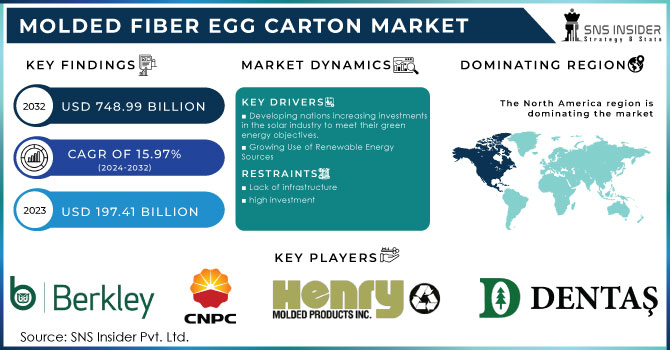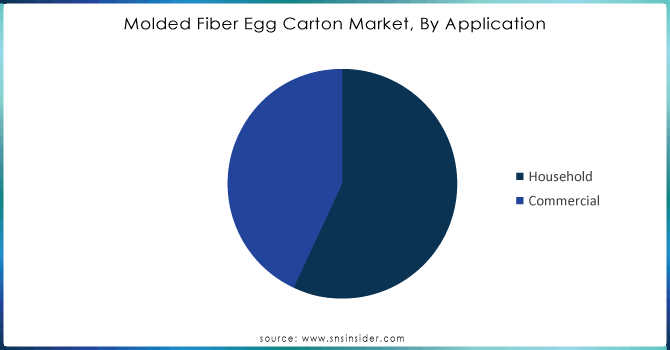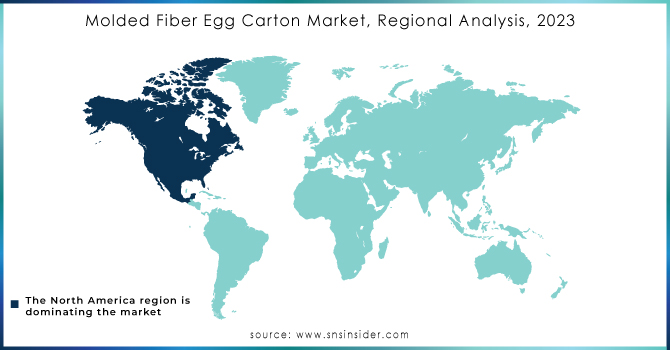Molded Fiber Egg Carton Market report scope & overview:

Get More Information on Molded Fiber Egg Carton Market - Request Sample Report
Molded Fiber Egg Carton Market Size was valued at USD 1.97 billion in 2023 and is expected to reach USD 5.47 billion by 2032 and grow at a CAGR of 12% over the forecast period 2024-2032.
The molded fiber egg carton market is experiencing a surge in demand fueled by a growing consumer preference for sustainable packaging options and stricter environmental regulations. This eco-friendly alternative to traditional plastic and polystyrene cartons is gaining traction as environmentally conscious consumers increasingly seek out products that align with their values.
Major players in the market, like China National Packaging and Berkley International, are capitalizing on this trend by investing heavily in research and development to expand their product portfolios and drive down production costs. These advancements are making molded fiber egg cartons a more competitive option, not only from an environmental standpoint but also in terms of affordability.
However, the molded fiber egg carton market also faces some challenges. Established plastic and polystyrene carton manufacturers hold a significant advantage due to their economies of scale, allowing them to produce cartons at a lower cost per unit. Additionally, the widespread adoption of molded fiber technology may be hindered by the lack of necessary infrastructure in certain regions.
MARKET DYNAMICS:
KEY DRIVERS:
-
Rising consumer awareness is expected to fuel significant market growth in the coming years.
Consumer awareness is the key driver behind the booming molded fiber egg carton market. A growing focus on environmental sustainability is influencing buying habits, highlighting a shift towards eco-friendly packaging. This consumer demand for sustainable options, perfectly met by recycled fiber cartons, is propelling market growth.
-
Governments tighten regulations on packaging to promote sustainability.
RESTRAINTS:
-
Molded fiber egg cartons are generally more expensive to produce compared to traditional plastic or polystyrene cartons.
The higher cost is due to several factors, including the raw materials used, the manufacturing process, and the lack of economies of scale compared to traditional options. Molded fiber typically requires more energy and labor to produce than plastic, and the machinery involved might be specialized or less widely available.
-
Molded fiber cartons may not stack as efficiently as plastic or polystyrene cartons.
OPPORTUNITIES:
-
Major retailers are taking the initiative to adopt sustainable packaging practices.
Retailers are increasingly prioritizing eco-friendly packaging, with molded fiber egg cartons becoming a top pick. This shift reflects a strategic move to align their brands with sustainability. By embracing eco-friendly options, retailers are meeting the growing demand of environmentally conscious consumers.
-
Partnering with eco-conscious brands can boost market reach.
CHALLENGES:
-
Molded fiber egg cartons face intense competition from well-established competitors in the market.
Plastic and polystyrene carton companies have been around for a long time and make cartons in large quantities. This way, they can produce cartons for much less money each compared to molded fiber cartons.
-
Some consumers may doubt the strength of molded fiber cartons.
IMPACT OF RUSSIA-UKRAINE WAR.
The war in Ukraine has disrupted the molded fiber egg carton market in several ways. Major paper and packaging companies like Mondi are scaling back operations in the region, impacting production and potentially creating supply chain issues. Secondly, the conflict has caused a surge in the price of kraft pulp, a key raw material for molded fiber cartons. This price increase, coupled with the broader rise in energy costs due to sanctions, could push production costs up for molded fiber manufacturers. While the long-term effects remain uncertain, the war has already created market instability and could lead to higher prices for molded fiber egg cartons. There's also a chance that the situation might incentivize increased recycling within the industry as access to virgin materials becomes more expensive or restricted.
IMPACT OF ECONOMIC SLOWDOWN
A potential economic slowdown could present a two-sided challenge for the molded fiber egg carton market. Recessionary pressures might lead producers to seek cost-cutting measures, potentially making the already more expensive molded fiber option less attractive. Partnering with experienced packaging companies that specialize in cost-efficiency during downturns could be crucial for molded fiber carton manufacturers to stay competitive. The rising cost of raw materials for traditional plastic egg cartons, fueled by supply chain disruptions and potentially exacerbated by a recession, could create a window of opportunity for molded fiber alternatives. Consumers, facing tighter budgets, may become more receptive to the price point of molded fiber cartons if the gap with traditional options narrows. Ultimately, the impact of a recession on the molded fiber egg carton market will depend on the relative price movements of its materials compared to traditional options, and the effectiveness of the molded fiber industry in controlling production costs through strategic partnerships.
KEY MARKET SEGMENTS:
By Type
-
10 Eggs
-
20 Eggs
-
30 Eggs
-
Others
The molded fiber egg carton market is segmented by 10 Eggs, 20 Eggs, 30 Eggs and Others. 30-egg carton dominating in the molded fiber egg carton market. This trend reflects a growing consumer preference for larger, family-sized packaging options. Furthermore, the eco-friendly nature of molded fiber cartons, made from recycled paper, aligns perfectly with this demand, leading to their increased adoption.
By Application
-
Household
-
Commercial
Molded fiber egg cartons are primarily used in the household market, driving the majority of revenue by 60% in this segment. This trend aligns with the growing emphasis on sustainable packaging options by environmentally conscious consumers. Brands that prioritize eco-friendly solutions like molded fiber cartons are more likely to resonate with this segment and build stronger customer connections.

Need any customization research on Molded Fiber Egg Carton Market - Enquiry Now
REGIONAL ANALYSES
North America is poised to be the leader in the molded fiber egg carton market. This dominance is fueled by many factors. Firstly, the region boasts a strong presence of major players like China National Packaging and Berkley International. Secondly, a growing focus on environmental responsibility is driving consumer demand for sustainable packaging solutions. Molded fiber egg cartons, aligned with this trend due to their use of recycled paper, are experiencing a surge in popularity, solidifying North America's position in this eco-friendly packaging market.
Europe claims the number two spot in the molded fiber egg carton market, driven by two key factors. Stricter regulations promoting sustainability are pushing companies towards eco-friendly options. Retailers themselves are increasingly prioritizing sustainable packaging. Within Europe, Germany reigns supreme in market share, while the UK is experiencing the fastest growth, highlighting the continent's overall commitment to environmentally conscious packaging solutions. The Asia-Pacific region is projected to see the fastest growth in molded fiber egg cartons, outpacing all other markets. Major retailers are prioritizing eco-friendly packaging to align with consumer expectations and their own sustainability goals, making molded fiber cartons, crafted from recycled materials, a highly attractive option. Additionally, China leads the region in market share, while India boasts the fastest growth rate, solidifying Asia-Pacific as a powerhouse in the sustainable egg carton market.

REGIONAL COVERAGE:
North America
-
US
-
Canada
-
Mexico
Europe
-
Eastern Europe
-
Poland
-
Romania
-
Hungary
-
Turkey
-
Rest of Eastern Europe
-
-
Western Europe
-
Germany
-
France
-
UK
-
Italy
-
Spain
-
Netherlands
-
Switzerland
-
Austria
-
Rest of Western Europe
-
Asia Pacific
-
China
-
India
-
Japan
-
South Korea
-
Vietnam
-
Singapore
-
Australia
-
Rest of Asia Pacific
Middle East & Africa
-
Middle East
-
UAE
-
Egypt
-
Saudi Arabia
-
Qatar
-
Rest of Middle East
-
-
Africa
-
Nigeria
-
South Africa
-
Rest of Africa
-
Latin America
-
Brazil
-
Argentina
-
Colombia
-
Rest of Latin America
KEY PLAYERS
The major key players are DFM (Dynamic Fibre Moulding), Okulovskaya Paper Factory, China National Packaging Corporation, Shaanxi Huanke, Dentaş Paper Industry, Henry Moulded Products, Berkley International, EnviroPAK, CEMOSA SOUL, Qingdao Xinya Molded Pulp Packaging Products Co. Ltd., Huhtamaki, Nippon Molding, Vernacare, FiberCel, UFP Technologies, Henry Moulded Products other players.
RECENT DEVELOPMENT
-
TekniPlex purchased Empaques Moldeados de America Tecnologias (EMATEC), a Mexican molded fiber packaging company, in November 2022.
-
In July 2022, Hartmann solidified its position as the second-largest supplier of molded-fiber egg cartons in North America by acquiring PACCOR Packaging Group's molded fiber business.
-
To strengthen its portfolio of sustainable solutions for fresh food packaging, Tekni-Plex acquired the assets and technologies of Fibro Corporation in January 2022.
| Report Attributes | Details |
|---|---|
| Market Size in 2023 | US$ 1.97 Bn |
| Market Size by 2032 | US$ 5.47 Bn |
| CAGR | CAGR of 12% From 2024 to 2032 |
| Base Year | 2023 |
| Forecast Period | 2024-2032 |
| Historical Data | 2020-2022 |
| Report Scope & Coverage | Market Size, Segments Analysis, Competitive Landscape, Regional Analysis, DROC & SWOT Analysis, Forecast Outlook |
| Key Segments | • By Type (10 Eggs,20 Eggs, 30 Eggs, Others) • By Application (Household, Commercial) |
| Regional Analysis/Coverage | North America (US, Canada, Mexico), Europe (Eastern Europe [Poland, Romania, Hungary, Turkey, Rest of Eastern Europe] Western Europe] Germany, France, UK, Italy, Spain, Netherlands, Switzerland, Austria, Rest of Western Europe]), Asia Pacific (China, India, Japan, South Korea, Vietnam, Singapore, Australia, Rest of Asia Pacific), Middle East & Africa (Middle East [UAE, Egypt, Saudi Arabia, Qatar, Rest of Middle East], Africa [Nigeria, South Africa, Rest of Africa], Latin America (Brazil, Argentina, Colombia Rest of Latin America) |
| Company Profiles | DFM (Dynamic Fibre Moulding), Okulovskaya Paper Factory, China National Packaging Corporation, Shaanxi Huanke, Dentaş Paper Industry, Henry Moulded Products, Berkley International, EnviroPAK, CEMOSA SOUL, Qingdao Xinya Molded Pulp Packaging Products Co. Ltd., Huhtamaki, Nippon Molding, Vernacare, FiberCel, UFP Technologies, Henry Moulded Products |
| Key Drivers | • Rising consumer awareness is expected to fuel significant market growth in the coming years. • Governments tighten regulations on packaging to promote sustainability. |
| Key Restraints | • Molded fiber egg cartons are generally more expensive to produce compared to traditional plastic or polystyrene cartons. • Molded fiber cartons may not stack as efficiently as plastic or polystyrene cartons. |

